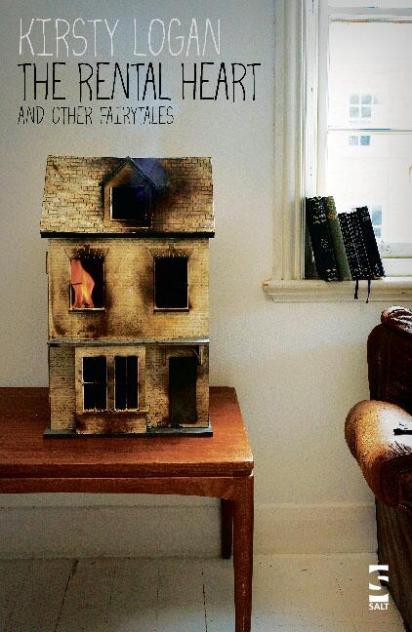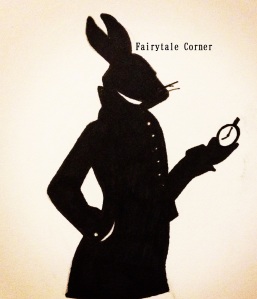
‘And until that day, you’ll have no idea just how far into the woods you’ve wandered.’
The children gaze up at her as she sits back, lacing her pale fingers together. She likes to scare them, to tell them horror stories disguised as folk tales. Children lured into hillsides, mutilated hands, dancing to death in red-hot shoes.
I lurk in the corner, the black widow, nursing my youngest. My breast lolls out of my dress, swollen and crinkled as rising dough. The baby’s teeth nip, but after six children I do not flinch. If he bit, I’d only realise when I saw the blood.
‘Once upon a time there was an evil witch, and she had a garden filled with the most wonderful…’
She’s off again, the pins in her hair catching the firelight like tiny stars. How is her hair still black? I am barely thirty and already my blonde is fading, uneven white streaks like I’ve been left too long on a windowsill. But hers is still black, her skin powdered white, her lips painted shiny as apples. She is pale, fragile: a china doll. My mother.
Once upon a time. I should begin like one of her stories, those silly fairy-scares that keep the children clustered around her feet until the fire burns to nothing, she tires herself into silence, and I have to round them up in the cold and the dark. When I am called the wicked witch for taking them away. My own children.
So. Once upon a time there was a beautiful girl with lips blood-red, hair ebony-black, skin snow-white. She had a child, a soft blonde angel. When the child was raised, the beautiful girl’s work was done: she had fulfilled her role as a woman. Her breasts emptied, her hands softened, her insides shrivelled like dead leaves. She moved slowly, thoughtfully. There was nothing to hurry for now. She was above the dirty business of men, of sex, of children. Her body did not bleed; it did not sweat or scream or cry.
She is fragile, unreal. She is pure fantasy.
And what of her beautiful blonde baby? I am swollen and stretched and sagging. Children tug at my skirts, pull me back down, clamour for more food, more toys, more stories.
The world is painted red from scraped knees, masked by the steam from bubbling pans. I crave a white room, white as my mother’s skin. I crave silence.
There is no silence by the fireside, but it’s as close as I can get. Instead of a maelstrom there is only one voice, one story.
‘But without the enchanted crown the prince could not find her, so…’
I watch the children from half-closed eyes. The baby has slipped from my breast; he sprawls in a warm-milk stupor on my lap. I pull my dress up, my nipples wet and rubbery against the fabric.
I should stand: there are six sets of clothes to wash, six dirty dishes to scrub, six pairs of shoes to polish. No, seven. Seven, because my mother does not. Can not. That is for me, my hands raw as a huntsman’s.
I should stand, I should go and… but why should I? Why should I ruin my hands, my body? Why should I be a fattened sow leaking milk, when she gets to be the china doll, the princess?
Perhaps it’s time I was the storyteller.
The next night I hold court by the fireside. My hands still ache from digging in the snow and it’s hard not to stare at the door, but I am determined to enjoy this.
The children bundle around my feet, eyes wide as eggs. They clamoured briefly for their usual storyteller, but when they were promised a brand new fairy-tale they hushed.
‘Once upon a time there was a girl with skin as white as snow…’
I tell a story of a jealous queen, a merciful hunter, a cruel forest. I tell of seven dwarves, a glass coffin, a girl kissed awake by a prince. I tell them that if you can save yourself once, you can save yourself twice.
By the time I scoop them into bed, I’ve almost managed to convince myself.
The snow has stopped falling when I go to find her. The white layer is flawless, my bare feet barely leaving tracks. My toes numbed as soon as I stepped outside and now they are starting to burn, like a fire deep in my bones. Like red-hot shoes. I press my feet further into the packed snow, making sure it numbs my ankles too. I want to know how it felt for her.
Even now I’m hoping that the story was true. That she will have been rescued, carried to a warm cottage full of the smells of baking and shoe polish. That she will be there now, waiting for her poisoned apple.
My mother lies in the middle of the clearing. Fresh snow has fallen, covering her. All I can see is her hair, spread out like a pool of oil, still black.
If you like what you read here today you can read more of Kirsty’s work here in her latest book ‘The Rental Heart and Other Fairytales.’



